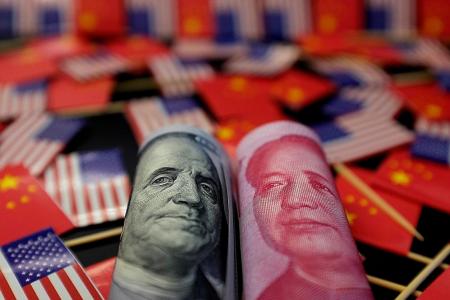China lets yuan fall as trade war escalates
SHANGHAI : China yesterday let the yuan tumble beyond the key 7-per-US dollar level for the first time in more than a decade, in a sign that Beijing might be willing to tolerate further currency weakness in the face of an escalating trade row with the US.
The sharp 1.4 per cent drop in the yuan comes days after US President Donald Trump stunned financial markets by vowing to impose 10 per cent tariffs on the remaining US$300 billion (S$415 billion) of Chinese imports from Sept 1, abruptly breaking a brief month-long ceasefire in the bruising trade war.
The People's Bank of China (PBOC) provided the early impetus for yuan bears, setting the daily mid-point of the currency's trading band at 6.9225 per US dollar, its weakest level since December last year.
"Today's fixing was the last line in the sand," said Mr Ken Cheung, senior Asian FX strategist at Mizuho Bank in Hong Kong. "The PBOC has fully given the green light to yuan depreciation."
After opening the onshore session at 6.9999 per US dollar, the yuan had weakened to 7.0300 per US dollar by 1pm, down 1.25 per cent on the day after earlier losing as much as 1.4 per cent of its value.
Yesterday marked the first time the yuan had breached the 7-per-US dollar level since May 9, 2008.
With the trade war giving Beijing fewer reasons to maintain yuan stability, analysts said they expect the currency to continue to weaken.
"In the short-term, the yuan's strength would be largely determined by the domestic economy. If third-quarter economic growth stabilises, the yuan could stabilise around 7.2 or 7.3 level," said Zhonghai Shengrong Capital Management chief economist Zhang Yi in Beijing.
Capital Economics senior China economist Julian Evans-Pritchard said the PBOC had probably been holding back against allowing a weaker yuan to avoid derailing trade negotiations with the US.
"The fact that it has now stopped defending 7.00 against the US dollar suggests that it has all but abandoned hopes for a trade deal with the US," he said.- REUTERS
Get The New Paper on your phone with the free TNP app. Download from the Apple App Store or Google Play Store now



